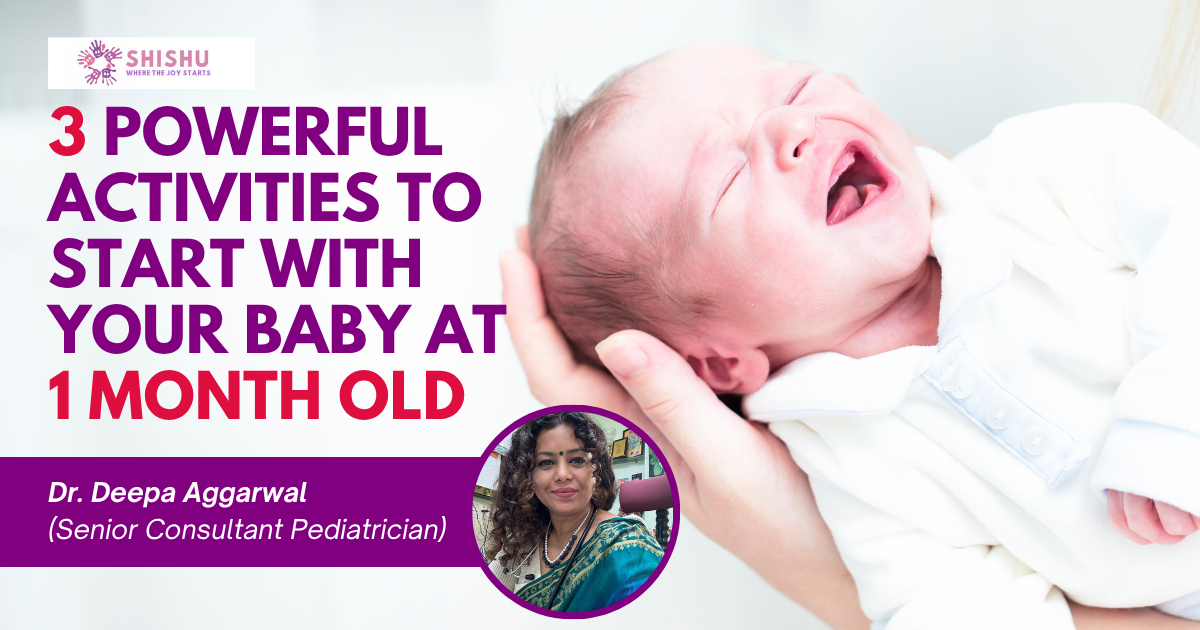
Your baby’s first month is more than feeding and diaper changes, it’s the start of lifelong growth.
The first few weeks with your newborn can feel like a whirlwind. But did you know that this tiny bundle is already absorbing, learning, and developing? The brain is forming over 1 million neural connections per second in these early weeks. That’s why intentional interaction from Day 1 matters more than we realize.
Here are 3 simple yet powerful activities you can start doing as soon as your baby turns 1 month old—no fancy toys needed, just you and your love.
👀 1. Red Bindi Face Time – Build Focus & Visual Tracking
Place a bright red dot (like a bindi or round bandage) on your forehead while talking or playing with your baby. Newborns are drawn to high-contrast colors—especially red—and are naturally wired to look at faces.
This simple trick:
- Helps improve visual focus and attention
- Encourages eye contact and early bonding
- Strengthens neural connections related to vision
🧠 Science says: Newborns can see best at 8–12 inches, the perfect distance when you’re holding them close. Visual tracking and facial recognition are key skills developing now.
🎶 2. Talk and Sing Often – Spark Language & Emotional Growth
Your baby may not understand words yet, but they’re already learning the rhythm and tone of language.
- Speak to your baby in short, expressive sentences (parentese)
- Sing lullabies, hum tunes, or even describe what you’re doing (“Now we change your diaper!”)
This builds:
- Auditory processing
- Early language foundations
- Emotional bonding and voice recognition
💡 Pro Tip: Babies love repetition. The more they hear your voice, the better they respond.
🤲 3. Gentle Touch – Stimulate Senses & Body Awareness
Touch isn’t just comforting—it’s a crucial developmental tool. Every diaper change or bath time is a chance to offer gentle, intentional stimulation.
Try:
- Stroking their hands and soles
- Lightly massaging the legs, arms, or back
- Using soft textures like cloth or feather for sensory input
🌱 Why it matters: Touch boosts the development of the nervous system and fosters a sense of body awareness and emotional security.
💛 It’s Not About Doing More. It’s About Being Present.
These aren’t “extra” tasks they’re small shifts in how we connect with our babies. Early interaction fuels a lifetime of learning, confidence, and attachment.
Start small. Stay consistent. And trust you’re doing enough.
🩺 When to Reach Out to Your Pediatrician
If your baby seems disinterested in faces, doesn’t respond to sounds by 1-2 months, or shows signs of extreme fussiness without comfort, it’s best to discuss it with your pediatrician.
📌 Takeaway for Parents
✅ A red bindi can help improve your baby’s focus.
✅ Talking and singing kickstart language development.
✅ Gentle touch stimulates the senses and builds trust.
✅ You don’t need gadgets your presence is powerful.
✅ Every interaction is wiring your baby’s brain for the future.
📞 Have concerns about your baby’s development? Book a consult today.
Dr. Deepa Aggarwal
Senior Consultant Pediatrician
📍 LHMC / AIIMS Delhi | Mayom Hospital, Gurgaon
📞 Teleconsultation & Appointments: 8448695085
🌐 drdeepaaggarwal.co.in
Wondering how to stimulate your newborn’s development? Start with 3 expert-backed activities: red bindi face time, singing, and touch. Pediatrician Dr. Deepa Aggarwal explains how these simple actions shape brain growth from Day 1.
💬 Are you already doing any of these with your baby? Comment below and share your experience with other new parents.
🔁 Forward this blog to a fellow parent who needs a reminder that the smallest moments are the biggest milestones.
